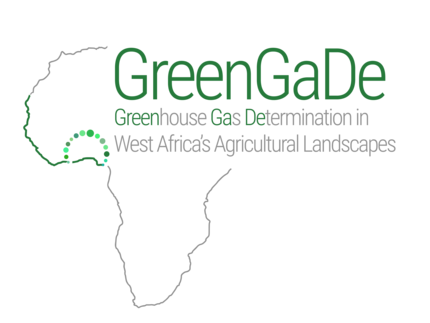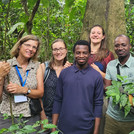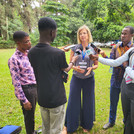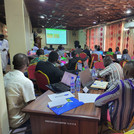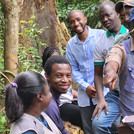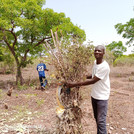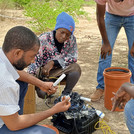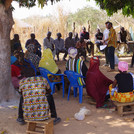Food production systems contribute significantly to global warming and are responsible for 19–29% of global greenhouse gas emissions. Especially in developing countries, 90% of greenhouse gas emissions originate from agriculture and deforestation. So far, it is not known how much greenhouse gases are released by different agricultural systems and management practices. In order to provide policymakers and managers with a clear basis for decision-making, such data and predictions are essential. This is the goal of GreenGaDe, a project funded by the German Federal Ministry of Education and Research (BMBF, runtime: 04/2021–03/2024) and being embedded in the trans-disciplinary West African Science Service Centre on Climate Change and Adapted Land Use WASCAL. In GreenGaDe, specialists in agronomy, forestry, modelling, environmental chemistry and monitoring, and sociology from Germany and three West African countries (Burkina Faso, Ghana and Niger) are working closely together. The scientists examine and compare different agro-ecosystems in West Africa, including forests, open savannahs, pastures and fields.
Official website: GreenGaDe
Mission
The primary aim of this project is to provide baseline data and predict future trends of greenhouse gas emissions and carbon stocks in the agricultural sector of West Africa. A consistent climate database at the local and regional level will be built up to support climate-smart policies in West Africa.
The overall goals of the projects are:
- Evaluate greenhouse gas emissions and carbon storage dynamics at national and regional scales in West Africa
- Guide national and regional climate change adaptation policies and strategies
- Develop strategies to accelerate the implementation of climate-smart agriculture approaches in smallholder’s farmers
The university of Potsdam has the lead and coordination of this project while being actively involved in the scientific output of GreenGaDe with WP 1 and 2 „Carbon pool dynamics“ and WP 8 „Synthesis“.
Opportunities
You are welcome to inquire about possibilities for job positions. Please check vacant positions or contact Prof. A. Linstädter (linstaedteruuni-potsdampde) directly. Should you seek opportunities for a Bachelor or Master thesis, please check our institutional list of topics for theses Topics for Theses.
Carbon Pool Dynamics and Synthesis
A major task will be to assess carbon pool dynamics in different parts of the ecosystem (tree layer, grass layer and soil), and to better understand how agro-ecosystems as a whole contribute to carbon fixation and greenhouse gas emission. Further, we want to understand how climate change itself will affect these processes in the future and how a sustainable land management can break this vicious circle.
Aims | Assessing the influence of land-use effects and climate change on carbon stocks in woody vegetation, grass layers and soil. Synthesizing data to develop models and predict carbon pool dynamics that can be upscaled to regional and national levels in West Africa. |
Approach | Various approaches to estimate carbon stock such as analysing existing dendrometric, vegetation and soil data from former projects and public databases as well as direct field measurements of woody and herbaceous vegetation and soil analyses. Synthetic analyses of the data compiled by the project consortium in combination with environmental data to understand effects of land-use and climate change on carbon stocks and greenhouse gas emissions. |
Expected Outcome | Understanding how carbon stocks and greenhouse gas emissions are contributed by woody vegetation, grass layers and soil in West Africa Landscape and developing climate smart approaches in regional and national climate policies. |
Persons Involved | PI PostDoc PhD Coordinator (contact person) Dr. Juliane Helm Juliane Christ |
Cooperation Partners | Forestry Research Institute of Ghana (CSIR-FORIG), Kumasi/ Ghana Institute for Environment and Agricultural Research (INERA), Ouagadougou/ Burkina Faso University Abdou Moumouni (UAM), Niamey/ Niger University Joseph Ki-Zerbo (UJKZ), Ouagadougou/ Burkina Faso Center for Environmental Systems Research, University of Kassel, Germany |

